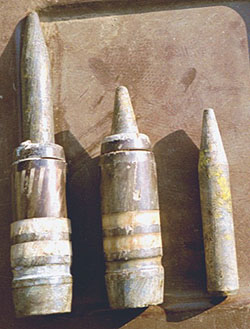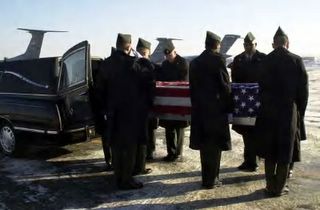A Letter from a Military Wife
| |
From the Parents of a Marine Reservist: This Government abandoned many of our loved ones not just once by this war of choice but then again by not caring enough to prepare, to demand and to fund the very best healthcare system for those who have answered this country's call to arms and have sacrificed so much.
| |
Recommended Viewing
America At a Crossroad-Part 1( A MUST SEE SERIES)
PBS-America At A Crossroad-Please click here to watch the series I am posting this entry today because this is something you should all go and read/watch. It will give you a better understanding of what our American Soldiers are facing on a daily basis being deployed to Iraq to fight for a country that doesn't want us there and are killing our troops on a daily basis. Below is a detailed description of what the show consists of and information about each show aired. America at a Crossroads is a major public television event premiering on PBS in April 2007 that explores the ...Bill Moyers on Why the Press Bought the Iraq War
The media took the Bush administration's Iraq claims at face value, but it didn't have to. Bill Moyers Journal: "Buying the War" will broadcast on PBS on Wednesday, April 25, 2007 at 9:00 p.m.
(check local listings - www.pbs.org/moyers).
The marketing of the war in Iraq by the administration has been much examined, but a critical question remains: How and why did the press buy it? The new Bill Moyers Journal documentary from PBS explores these very questions.
Bill Moyers and his team piece together the reporting that shows how the media were complicit in shaping the "public mind" toward the war, and ask what's happened to the press's role as skeptical "watchdog" over government power. This segment features the work of some intrepid journalists who didn't take the government's word at face value, including the team of reporters at Knight Ridder news service whose reporting turned up evidence at odds with the official view of reality.

Sundance channel airing two great dvds - one we know about = 'Ground Truth' and if you haven't yet seen 'Sir! No Sir!' then I'd like to recommend it - highly.
http://www.sundancechannel.com/schedule/
On Monday May 7th 2007...there will be an historic night of GI resistance on national television as the Sundance Channel presents the U.S. broadcast premiere of both.
Sir! No Sir!
Monday, May 7
The Sundance Channel
9 pm Eastern
8 pm Central
7 pm Mountain
6 pm Pacific
The Ground Truth
Monday, May 7
The Sundance Channel
10:30 pm Eastern
9:30 pm Central
8:30 pm Mountain
7:30 pm Pacific
*******************
This is a wonderful chance for millions of people to see these films that, together, link the tremendous movement of American soldiers against the Vietnam war with the growing opposition
among soldiers to the Iraq war today.
Voices from U.S. Labor on Iraq
Troop Mobilizations
National Guard (In Federal Status) And Reserve Mobilized As Of April 25, 2007
News Releases are official statements of the Department of Defense.My Note:All U.S. Army troops to have Extended Deployments. Can you say 'Stop Loss'? Can you say 'Back Door Draft'? Can you say 'Involuntary Military'?
Three Months Tacked Onto All Army Combat Deployments
From VOA: The U.S. Defense Department announced Wednesday that most of the U.S. army troops now in Iraq and Afghanistan and other parts of the Middle East and East Africa will have their assignments extended from 12 months to 15 months, and that the longer tours of duty will apply to soldiers who deploy to the region for the foreseeable future. VOA's Al Pessin reports from the Pentagon the move
Memorials
More soldiers from Fort Lewis killed in Iraq; Memorials at Fort Lewis, Washington state
Memorials
FORT LEWIS, Wash. (I Corps Release) -- A memorial ceremony for Cpl. Michael Mathew
Rojas and Cpl. Wade James Oglesby will be held Tuesday, April 24 at 2:30
p.m. in the Main Post Chapel, where they will be remembered by family,
friends, Soldiers and the Fort Lewis community.
Memorial
FORT LEWIS, Wash.(I Corps release) -- A memorial ceremony for Sgt. Larry R. Bowman
will be held Thursday, April 19 at 2:30 p.m. in the Main Post Chapel.
9 Fort Bragg Families Told of 82nd Airborne paratroopers deaths in Iraq
Officials at Fort Bragg, N.C., met Tuesday with the families of paratroopers killed a day earlier in Iraq. A truck bomb claimed the lives of nine members of the Army's elite 82nd Airborne Division, based at Fort Bragg.
Wounded Soldiers - Broken VA Medical Care Services
Eight Thousand Soldiers with Traumatic Brain Injuries
Iraq war brain trauma victims turn to private careOpinion: Proactive Community Needed to Help Troops Reconnect, Reintegrate
From the Spring Grove [MN] Herald: I am watching the growing furor over the shortcomings in the Veterans Administration system and the fallout from Walter Reed Army Hospital with growing alarm. I am concerned that we are going to fix the crisis and forget the problem. The problem is how to help warriors, and their families, successfully reintegrate back into our communities, and their homesFamily 'Respectfully Disagrees' With VA Report on Son's Suicide
From the Associated Press: [Iraq vet Jonathan] Schulze had made at least 40 visits to the VA hospital in Minneapolis, where doctors diagnosed him with post-traumatic stress disorder, the report said. But it said mental health workers at the St. Cloud hospital told investigators Schulze never mentioned suicide to them, and they would have taken it seriously if he had. “The report and story hasU.S. News & World Report: More Evidence That Military Downgrading Disability Ratings
The evidence keeps piling up: U.S. military appears to have dispensed low disability ratings to wounded service members with serious injuries and thus avoided paying them full military disabled retirement benefits. While most recent attention has been paid to substandard conditions and outpatient care at Walter Reed Army Medical Center, the first stop for many wounded soldiers statesideLead Ft. Lewis Army Lawyer: Military Stacks Deck Against PTSD, TBI-injured Troops
Lots of articles, for good reason, coming out on the topic exploring the issue of troops not getting a fair shake when going through their disability claims processing; I recently was asked to contribute some background material on an upcoming piece for the Tacoma News-Tribune. This latest piece, from Military Times, also concerns troops at Washington state's Fort Lewis: The Army disabilityArmy made video warning about dangers of depleted uranium but never showed it to troops
| David Edwards Published: Tuesday February 6, 2007 | |
| |
 A special investigation on the effects of depleted uranium reveals the Army made a tape warning of the effects of depleted uranium which was never shown to troops despite the fact the Pentagon knew the agent to be potentially deadly, CNN reports Tuesday.
A special investigation on the effects of depleted uranium reveals the Army made a tape warning of the effects of depleted uranium which was never shown to troops despite the fact the Pentagon knew the agent to be potentially deadly, CNN reports Tuesday.
Depleted uranium -- or DU -- was used in the Gulf War as a projectile that could penetrate tank armor. A group of soldiers are suing the US government because they are sick from exposure; despite the unshown video, the Army denies that depleted uranium represents a serious health risk.
CNN reporter Greg Hunter explains. The soldiers "report similar ailments. Painful urination, headaches and joint pain. They say Army doctors blame their symptoms on post traumatic stress. We showed them a tape the Army made in 1995, a tape the Army never distributed. It warned of potential D.U. hazards. The army's expert on D.U. training concedes some information contained on the tape is true. For instance, radioactive particles can be harmful."
A doctor who once investigated DU for the Army now believes that the health risks are serious.
"In the 1990s this doctor studied D.U. health effects for the U.S. military," Hunter says. "Now a private researcher, he says his own test of these veterans showed abnormally high levels of D.U. this their urine and that those levels pose a serious health threat."
"One doctor... calls it, quote, 'a radiological sewer,'" Hunter adds. "The Army adamantly denies that."Depleted Uranium: Poisoning Our Planet
Depleted Uranium used in weaponry of U.S. troops - NOT depleted, in fact, radioactive and causes radiation poisoning illnesses. Veteran Activist Dennis Kyne speaks at Portland State University in Portland, Oregon. Link to article and video.
Troop Resistance
Army Raises 2006 Desertion Figure by 1,000
From the Pasadena Weekly: [T]he US Army has revised its count of active duty soldiers who have deserted the military, raising that figure by almost 1,000 for fiscal year 2006 alone. Until the new figures were released on March 23, it had been widely reported that the number of deserters and soldiers absent without leave, or AWOL, had been decreasing since the start of the Iraq War except for aPolitically Speaking
Kucinich introduces impeachment resolution against Cheney
Raw Story reports that late today Dennis Kucinich submitted House Resolution 333 which sets out three "deeply researched" charges against Vice President Dick Cheney. The articles of impeachment and supporting documents are on Kucinich's site. Here's the transcript of his press conference in a Washington Post article.House Set to Vote on Compromise War-Funds Bill
Gen. David Petraeus visits Capitol Hill Wednesday as the House of Representatives prepares to vote on a measure that will directly affect his mission in Iraq. The bill would both fund the war and set a timetable for U.S. withdrawal.
Bush Repeats Threat to Veto Iraq Spending Bill
Speaking at the White House, President Bush repeats his threat to veto an Iraq war spending bill that includes a timetable for the withdrawal of United States troops from Iraq. Congressional Democrats agreed Monday to a bill that would require troops to begin leaving Iraq on Oct. 1.













